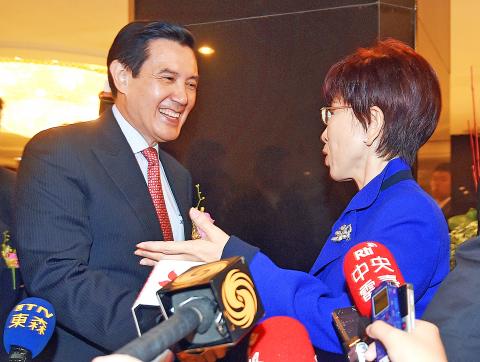Chinese Nationalist Party (KMT) presidential candidate Hung Hsiu-chu (洪秀柱) yesterday reiterated that her cross-strait policy is no different from that of President Ma Ying-jeou (馬英九), a day after KMT Chairman Eric Chu (朱立倫) said her policy deviated from the mainstream and that the party has decided to call an extempore congress to consider a new candidate.
Speaking at the World Peace Congress held by the Chinese World and Nation Peace Association, Hung said she is “still the presidential candidate nominated by the KMT.”
Addressing the crowd, Hung said she was “alone on the stage” as the president had just left.

Photo: Liao Chen-huei, Taipei Times
She recounted her candidacy from the first day she registered for the KMT primary.
“I have felt this solitude since the day I registered for the primary, but I have not been alone or lonely, since I have many friends supporting me. Today, there are people who said it felt awkward as they do not know how to address me. It is not. I am the deputy legislative speaker of the Republic of China, and currently still the KMT presidential candidate,” Hung said.
She said that Ma “once publicly stated on television that my cross-strait policy is no different from his.”
“My ‘one China’ is the Republic of China,” she said, adding that Ma’s cross-strait policy has gained people’s trust and reflects mainstream public opinion.
While there is very little difference between her cross-strait policy and Ma’s, hers is “clearer on certain aspects,” Hung said.
She highlighted the need for a peace agreement, saying that to secure the achievements Ma has made in cross-strait relations over the past seven years, there needs to be “a breakthrough and a deepening of the [so-called] ‘1992 consensus.’”
Ma, who left yesterday’s event early, had a chance to shake hands with Hung before leaving. He did not respond to media queries about Hung’s cross-strait policy and whether he would talk her out of the race. He said he would stand by the decision made by KMT headquarters.
Separately, World Taiwanese Chambers of Commerce president Jonathan Huang (黃正勝), who is also the head of a Hung supporters’ club within the association, said Hung’s comment on the “eventual unification” with China worries many Taiwanese businesspeople.
“Cross-strait relations should have been the KMT’s forte. Why has it become a problem [for the party], which has aroused the concern of many overseas Taiwanese businesspeople? Why talk about ultimate unification? There is no need to stir up a hornet’s nest,” Huang said.

Chinese spouse and influencer Guan Guan’s (關關) residency permit has been revoked for repeatedly posting pro-China videos that threaten national security, the National Immigration Agency confirmed today. Guan Guan has said many controversial statements in her videos posted to Douyin (抖音), including “the red flag will soon be painted all over Taiwan” and “Taiwan is an inseparable part of China,” and expressing hope for expedited reunification. The agency last year received multiple reports alleging that Guan Guan had advocated for armed reunification. After verifying the reports, the agency last month issued a notice requiring her to appear and explain her actions. Guan

A preclearance service to facilitate entry for people traveling to select airports in Japan would be available from Thursday next week to Feb. 25 at Taiwan Taoyuan International Airport, Taoyuan International Airport Corp (TIAC) said on Tuesday. The service was first made available to Taiwanese travelers throughout the winter vacation of 2024 and during the Lunar New Year holiday. In addition to flights to the Japanese cities of Hakodate, Asahikawa, Akita, Sendai, Niigata, Okayama, Takamatsu, Kumamoto and Kagoshima, the service would be available to travelers to Kobe and Oita. The service can be accessed by passengers of 15 flight routes operated by

GIVE AND TAKE: Blood demand continues to rise each year, while fewer young donors are available due to the nation’s falling birthrate, a doctor said Blood donors can redeem points earned from donations to obtain limited edition Formosan black bear travel mugs, the Kaohsiung Blood Center said yesterday, as it announced a goal of stocking 20,000 units of blood prior to the Lunar New Year. The last month of the lunar year is National Blood Donation Month, when local centers seek to stockpile blood for use during the Lunar New Year holiday. The blood demand in southern Taiwan — including Tainan and Kaohsiung, as well as Chiayi, Pingtung, Penghu and Taitung counties — is about 2,000 units per day, the center said. The donation campaign aims to boost

The Central Weather Administration (CWA) said a magnitude 4.9 earthquake that struck off the coast of eastern Taiwan yesterday was an independent event and part of a stress-adjustment process. The earthquake occurred at 4:47pm, with its epicenter at sea about 45.4km south of Yilan County Hall at a depth of 5.9km, the CWA said. The quake's intensity, which gauges the actual effects of a temblor, was highest in several townships in Yilan and neighboring Hualien County, where it measured 4 on Taiwan's seven-tier intensity scale, the CWA said. Lin Po-yu (林柏佑), a division chief at the CWA's Seismological Center, told a news conference